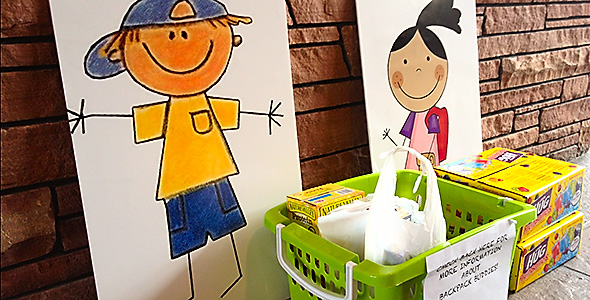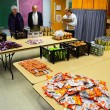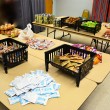
Designed to help meet the needs of hungry children at times when other resources are not available, such as weekends and school vacations. Two meals are provided for each student and the bags are discreetly placed in their backpacks.
Overview
Good nutrition, particularly in the first three years of life, is important in establishing a good foundation that has implications for a child’s future physical and mental health, academic achievement, and economic productivity. Unfortunately, food insecurity is an obstacle that threatens that critical foundation. According to the United States Department of Agriculture (USDA), 16.7 million children under 18 in the United States live in households where they are unable to consistently access enough nutritious food necessary for a healthy life. Although food insecurity is harmful to any individual, it can be particularly devastating among children due to their increased vulnerability and the potential for long-term consequences.
Infancy & Development
Children growing up in food-insecure families are vulnerable to poor health and stunted development from the earliest stages of life.
- Pregnant women who experience food insecurity are more likely to experience birth complications than women who are food secure.
- Inadequate access to food during pregnancy has been shown to increase the risk for low birth weight in babies.
- Food insecurity has also been linked with delayed development, poorer attachment, and learning difficulties in the first two years of life.
Health Concerns
Studies have found that food insecurity has been associated with health problems for children that may hinder their ability to function normally and participate fully in school and other activities.
- Children who are food insecure are more likely to require hospitalization.
- Children who are food insecure may be at higher risk for chronic health conditions, such as anemia, and asthma.
- Children who are food insecure may have more frequent instances of oral health problems.
- Food insecurity among young children is associated with poorer physical quality of life, which may prevent them from fully engaging in daily activities such as school and social interaction with peers.
Behavioral Challenges
Children who experience food insecurity may be at higher risk for behavioral issues and social difficulties.
- Food insecure children may be at greater risk of truancy and school tardiness.
- When they are in school, children who are food insecure may experiences increases in an array of behavior problems including: fighting, hyperactivity, aggression, anxiety, mood swings, and bullying.
Quick Facts

- We are currently supporting 50 students at Hoover Elementary. Word has spread quickly within the school community…there is already a waiting list.
- Each individual food bag is filled with approximately $4.00 worth of nutritious and kid-friendly food.
- Food bags are delivered on Wednesdays, and go home with the students in time for the weekend.
- Since this is a first effort of its kind, we are trying to keep it to a manageable scale (50 students) while we develop our system of support. Our hope is to spread the word to several other potential community partners, and see more teams develop!
Four Ways to be a Backpack Buddy
| Donate | Financial contributions of any amount are most helpful and appreciated. Food donations according to the approved list are also welcome! |
| Pack | Help pack the food into individual bags for the students to take home. Packing dates will be on the church calendar and at the Backpack Buddies Display. |
| Deliver | Bring the food to Hoover, usually each Wednesday. Requires a vehicle and some lifting. |
| Pray | Pray for the school children, the community partners behind this effort, and for an end to childhood hunger. |
Your Donations Are Always Welcome!
We can get the most “bang for the buck” with actual bucks, so please consider a financial donation. Donated food is also welcome, provided that it is from this approved list:
- Peanut butter
- Trail mix, nuts in pouches
- Fruit cups/applesauce
- Fruit–apples, oranges
- Pull tab/pop top cans of noodles, protein
- Cans of soup
- Cans of protein (meat, chili)
- Small boxes of raisins
- Peanut butter or cheese crackers
- Granola bars
Backpack Buddies Hoover Team
Partners are joining together to share the responsibilities and support for this weekly effort. As of today, our partners include:
- Capitol City Republican Women
- First United Methodist Church
- Sprague High School Leadership Class
- Marion-Polk Food Share
- Chemeketa Community College Psychology Class
Saint Mark Backpack Buddies Contacts
- Nancy and Kelly Carlisle
- Diane and David Painter
- Joyce Peters
- Saint Mark office – (503) 588-0141

